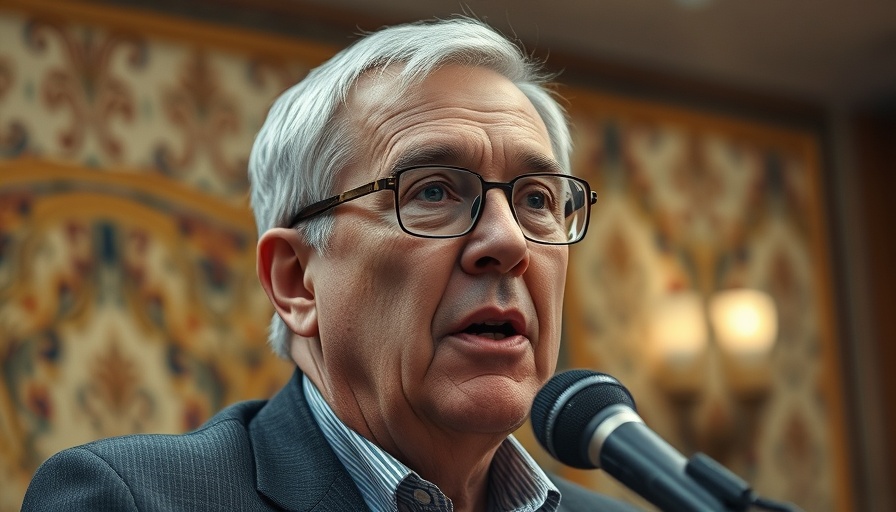
The Population Debate: Are We Misunderstanding the Issue?
In recent conversations surrounding population dynamics, the focus has shifted dramatically from sheer numbers to the pressing issue of fertility rates. Unlike previous decades, where conversations consistently revolved around overpopulation and resource depletion, today's discussions highlight an alarming decrease in fertility rates, particularly in developed nations. Experts argue that this decline is not just a statistic but a significant societal challenge that necessitates urgent attention. The video "Do we have a population problem?" sheds light on this pressing issue, prompting us to explore its implications.
In "Do we have a population problem?", the discussion dives into fertility rates, exploring key insights that sparked a deeper analysis on our end.
Understanding Fertility Rates: A Global Perspective
Globally, the replacement fertility rate stands at around 2.1 children per woman. However, many regions, including Europe and parts of Asia, are witnessing rates that have dipped below this crucial threshold. For instance, countries like Italy and Japan are grappling with the consequences of declining birth rates, such as aging populations and vanishing communities. As individuals in their 30s express their anxiety about future parenthood, stark contrasts emerge between earlier generations who prioritized family planning and today's youths who are challenged by the pressures of modern living. This startling evolution signifies an urgent need to reassess our societal structures and support systems to promote a healthier relationship with parenthood.
The Longevity Factor: Bridging Generational Gaps
What does living longer mean for the future of our societies? As pointed out in the video, extending our lifespans doesn’t have to lead to societal collapse. Rather, it’s essential to cultivate a dynamic coexistence among generations. Imagine a world where older individuals, wielding the wisdom of experience, actively engage with younger generations bursting with youthful energy. By embracing longevity and encouraging intergenerational relationships, we can foster environments that nurture both child-rearing and personal fulfillment, ultimately enriching society.
Environmental Influences: The Role of Lifestyle Choices
Challenges that many face when contemplating parenthood don't merely stem from personal choice but are also influenced by environmental factors. The rise of chemicals, plastics, and pesticides in our daily lives cannot be ignored. Many experts are now probing how these substances affect reproductive health and contribute to lower fertility rates. The dialogue around sustainable living, then, becomes more than just an ideal; it serves as a necessary framework for protecting future generations. Educating ourselves and others about the impacts of chemicals around us is vital in nurturing a healthier, more fertile society.
Creating a Culture of Parenthood
To address the fertility concerns and counter demographic decline, we must foster a culture that values parenthood. This involves openly discussing the challenges of modern parenting, including financial considerations, work-life balance, and emotional preparedness. By sharing experiences of parenthood as an enriching and fulfilling life choice, and providing accessible resources for new parents, we can inspire potential parents to embrace this journey. Creating an environment that celebrates families and supports parents from all walks of life is essential for a thriving society.
Actionable Insights: Steps to Consider
As executives and entrepreneurs, it's vital to recognize the implications of declining fertility rates and contribute to nurturing a supportive environment. Here are some actionable insights:
- Advocate for Flexible Work Policies: Promote policies that support work-life balance, making it easier for parents to navigate both professional obligations and family responsibilities.
- Support Family-Friendly Initiatives: Engage in community programs or corporate sponsorships that educate prospective parents on family planning and parenting resources.
- Invest in Sustainable Practices: Encourage sustainable practices in your business operations that prioritize health and well-being, reflecting a commitment to future generations.
Through these steps, we can collectively address the fertility rate challenge and cultivate a society that celebrates families.
Your Role in Shaping Society's Future
Reflecting back on the insights from the video "Do we have a population problem?", it’s essential for each of us to consider our role in shaping the future. Longevity and the value of parenthood are intertwined, urging us to advocate for a supportive framework that inspires couples to embrace family life. The choices we make today will determine the societal landscape of tomorrow, reminding us that nurturing community, supporting policies that encourage family life, and fostering intergenerational dialogue are all imperative. Let's take proactive steps toward building a more vibrant future together.
 Add Row
Add Row  Add
Add 




 Add Row
Add Row  Add
Add 

Write A Comment